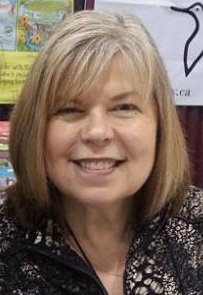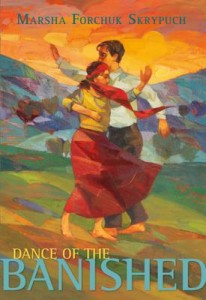Okay, if you’ve ever wondered if you might be an introvert, here are five key warning signs:
1. The thought of spending an entire day at home in your PJ’s gives you a thrill. Because a PJ day is the Best. Day. Ever.
2. You’d rather have an enema than get dragged to any event requiring audience participation.
3. You feel like you have ADHD, because your brain is constantly juggling two or three different thoughts, worries or imaginary conversations at the same time.
4. You’ve smacked right into something that you didn’t see because you were daydreaming. (True story: I slammed my bike into the back of a parked car while riding full speed down a steep hill. I was daydreaming.)
5. The thought of being in Marsha Skrypuch’s shoes on August 22nd gives you heart palpitations.

Yes, Marsha Skrypuch. On Friday, August 22nd, she’s going to endure every introvert’s nightmare. She’s going to abandon her pajamas and put on real clothes, drive to Brantford (ideally, without daydreaming), and then try to focus long enough to get through a plaque unveiling (to commemorate the 100th anniversary of Canada’s first national internment operations), plus the official launch of her new book, Dance of the Banished. If the thought of slogging through a day like that makes you want to fake an appendicitis attack, you’re probably an introvert.
Luckily for us, Marsha isn’t. I hope you’ll join her on August 22nd if you’re in the area (to get all the details, click here). If you can’t make it, Marsha’s sent along a couple of interesting blog posts for you to read, instead—she really is that nice. You can find the first one, Ten Tips For Writing That First Novel, right here. And her follow-up post—which demystifies the term narrative non-fiction—is below (just keep scrolling)…
Fiction, Non-fiction and Narrative Non-fiction
by Marsha Skrypuch
Most people will say that fiction is fake and non-fiction is true, but have you ever had a news article written about yourself or a topic you’re very familiar with? Was it 100% accurate? Not likely!
Yet news articles are supposed to be non-fiction. Ditto for textbooks. They’re filled with facts and figures that are based on suppositions of the time but that doesn’t make them true.
When I write fiction, I use real events, real places, the real food that was eaten and—if I can find it—I’ll even include the real weather. In my newest novel, Dance of the Banished, Zeynep witnesses a solar eclipse that actually did take place a hundred years ago on the exact date and time that she witnessed it. All of the history is real in this novel and everything that happened did occur.
So why isn’t it called non-fiction? Because I’ve made up dialogue and my characters are my creations based on real people, but they’re composites of the real people who lived a hundred years ago.
Most of the books that I write are categorized as fiction because the characters and dialogue were created by me, but I have also written non-fiction—Last Airlift: A Vietnamese Orphan’s Rescue from War, and One Step At A Time: A Vietnamese Orphan Finds Her Way are written in a style that’s called “narrative non-fiction.” What that means is they have a story arc similar to fiction and there are scenes and characters just like in fiction. The difference is that the characters in narrative non-fiction are the actual real people, not composites that I made up. The scenes are recreations of incidents that Tuyet told me about, or if it was an incident she didn’t remember, someone else told me about. I did make up the dialogue, but then Tuyet herself read it and either said it sounded like what she would have said, or she changed it herself.
For me, writing narrative non-fiction and writing fiction are two ways of being able to tell the truth. Sometimes I don’t know until partway through a story whether I’ll be writing it as fiction or non-fiction. For me as the writer, the research process for both forms is the same, and the accuracy of the events is the same.
The thing that sets my non-fiction apart from my fiction is whether I can find a person whose story on its own is well-documented enough to write a whole book about. That was the case with Tuyet because she is still alive and so are her siblings and mother. I could interview them, and I could talk to various caregivers and volunteers to paint a good picture of exactly what happened to her.
But what about Lida in Making Bombs for Hitler? She is a composite character and her story is written in novel form. The reason I did this for her story is because most of the slave labourers like Lida in WWII died. It’s hard to interview a person once they’ve died! In order to find her story, I read diaries and documents and government reports, and I interviewed survivors who had lived through one aspect of Lida’s experiences. I pulled incidents from here and there and wove the whole. Everything in that novel did happen, but not specifically to a girl named Lida.
When I began researching Dance of the Banished, I had hoped to write it as non-fiction. I was able to access newspaper clippings, diaries, letters, maps and government reports about a young man’s arrest and internment, and also about what it was like for a girl to be left behind in Ottoman Turkey, in a country plunged in the midst of an ill-planned war.
But I couldn’t interview a person like Ali, nor anyone like Zeynep because their story happened a hundred years ago. Even though the day-to-day events are well documented, and in my novel they happen at the exact time they did a hundred years ago, if I’d written the book as non-fiction I wouldn’t have been able to breathe life into Ali and Zeynep. I wouldn’t have felt comfortable giving them words and thoughts and wants if I couldn’t ask them, couldn’t interview them.




Thank you, Marsha, for this illuminating explanation of fiction, non-fiction, and narrative non-fiction. It’s fascinating to learn more about what all is involved in your research process and how you decide which genre to use. Best wishes for your book launch—I’d love to be there if only I lived closer!
I agree with you, Karen. Marsha is a wealth of information–I really enjoy reading her posts!
Brenda